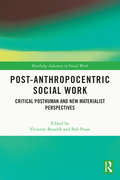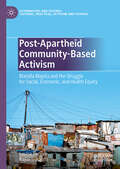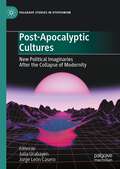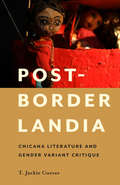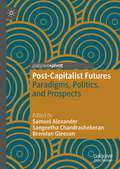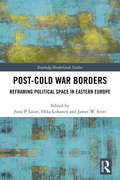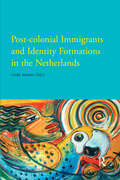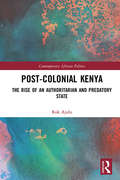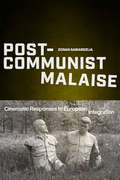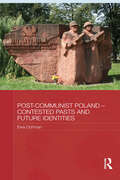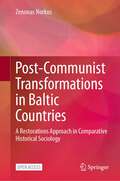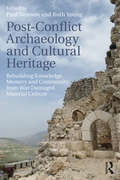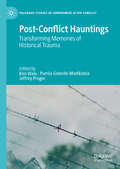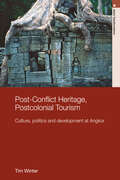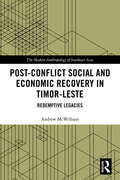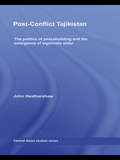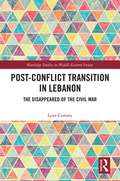- Table View
- List View
Post-9/11 Espionage Fiction in the US and Pakistan: Spies and "Terrorists" (Routledge Contemporary South Asia Series)
by Cara N. CilanoAs the events of 11 September 2001 and their aftermath influence new developments in spy fiction as a popular genre, an examination of these literary narratives concerned with espionage and terrorism can reshape our approach to non-fictive representations of the same concerns. Post-9/11 Espionage Fiction in the US and Pakistan examines post-9/11 American spy fictions alongside Pakistani novels that draw upon many of the same figures, tropes, and conventions. As the Pakistani texts re-place spy fiction’s conventions, they offer another vantage point from which to view the affective appeals common to these conventions’ usual deployment in American texts. This book argues that the appropriation by Pakistani writers of these conventions insistently tracks how the formulaic and popular nature of post-9/11 American espionage thrillers forwards and reinforces "appropriate" affective responses, often linked to domestic sites and relations, to "terrorism." It also analyses and compares American and Pakistani representations of the twinned figures of the spy (or his proxy) and the "terrorist," a term frequently conflated with fundamentalist. The insights of these analyses can serve as interpretive interruptions of non-fictive representations of Pakistani-US "war on terror" relations. Offering an innovative analysis of the reflection of narrative conventions in our view of the real-life events, this book will attract scholars with an interest in Pakistani literature, Postcolonial literature, Asian Studies and Terrorism studies.
Post-9/11 Historical Fiction and Alternate History Fiction: Transnational and Multidirectional Memory
by Pei-chen LiaoDrawing on theories of historiography, memory, and diaspora, as well as from existing genre studies, this book explores why contemporary writers are so fascinated with history. Pei-chen Liao considers how fiction contributes to the making and remaking of the transnational history of the U.S. by thinking beyond and before 9/11, investigating how the dynamics of memory, as well as the emergent present, influences readers’ reception of historical fiction and alternate history fiction and their interpretation of the past. Set against the historical backdrop of WWII, the Vietnam War, and the War on Terror, the novels under discussion tell Jewish, Japanese, white American, African, Muslim, and Native Americans’ stories of trauma and survival. As a means to transmit memories of past events, these novels demonstrate how multidirectional memory can be not only collective but connective, as exemplified by the echoes that post-9/11 readers hear between different histories of violence that the novels chronicle, as well as between the past and the present.
Post-AIDS Discourse in Health Communication: Sociocultural Interpretations (Routledge Research in Health Communication)
by Ambar BasuThis book examines the discourse of a "post-AIDS" culture, and the medical-discursive shift from crisis and death to survival and living. Contributions from a diverse group of international scholars interrogate and engage with the cultural, social, political, scientific, historical, global, and local consumptions of the term "post-AIDS" from the perspective of meaning-making on health, illness, and well-being. The chapters critique and connect meanings of "post-AIDS" to topics such as neoliberalism; race, gender, and advocacy; disclosure; relationships and intimacy; stigma and structural violence; family and community; migration; work; survival; normativity; NGOs, transnational organizations; aging and end-of-life care; the politics of ART and PrEP; mental illness; campaigns; social media; and religion. Using a range of methodological tools, the scholarship herein asks how "post-AIDS" or the "End of the Epidemic" is communicated and made sense of in everyday discourse, what current meanings are circulated and consumed on and around HIV and AIDS, and provides thorough commentary and critique of a "post-AIDS" time. This book will be an essential read for scholars and students of health communication, sociology of health and illness, medical humanities, political science, and medical anthropology, as well as for policy makers and activists.
Post-Anthropocentric Social Work: Critical Posthuman and New Materialist Perspectives (Routledge Advances in Social Work)
by Bob Pease Vivienne BozalekThis book seeks to trouble taken-for-granted assumptions of anthropocentrism and humanism in social work - that which perpetuates human privilege and human exceptionalism. The edited collection provides a different imaginary for social work by introducing ways of thinking otherwise, which challenge human exceptionalism. Social work is at heart a liberal humanist project informed by a strong human rights framework. This edited collection draws on the literature on affect, feminist new materialism and critical posthumanism to critique the liberal framework, which includes human rights. Disrupting anthropocentrism in social work which positions humans as an elite species at the centre of world history, this book develops an ethical sensibility that values entanglements of human, non-human life and the natural environment. The book provides new insights into environmental destruction, human-animal relations, gender inequality and male dominance as well as indigenous and settler/colonial issues, critical and green social work. It will be of interest to all scholars and students of social work, community development, social policy and development studies more broadly.
Post-Apartheid Community-Based Activism: Mandla Majola and the Struggle for Social, Economic, and Health Equity (Alternatives and Futures: Cultures, Practices, Activism and Utopias)
by Rajini Srikanth Louise PennerThis book provides a timely study of community-based activism in contemporary South Africa. Grounded in oral history, the book examines the acquired expertise and life experiences of an impactful South African activist, Mandla Majola, within the context of the people, circumstances, and affiliations that have shaped his strategic thinking and practice. The authors situate Mandla Majola’s activist and everyday experiences within histories of the complex connections between post-apartheid political and social movements and human rights discourse as they emerged after 1994. The book illuminates the relationship of state power to public health activism for HIV, tuberculosis and COVID-19 and for a life of basic human dignity, including access to sanitation and housing. Mandla Majola’s life spotlights the inspiring, sometimes grueling, and tireless quotidian work of thousands of “invisible” community-based activists whose collective actions have impacted the entire spectrum of social and economic rights of untold numbers of people in South Africa and beyond.
Post-Apocalyptic Cultures: New Political Imaginaries After the Collapse of Modernity (Palgrave Studies in Utopianism)
by Julia Urabayen Jorge León CaseroThis book advocates for the necessity of recovering the value of utopias as political projects that open new channels of action. The criticism of modern political utopias is based on the supposed impossibility of creating for the future because there is no longer a future (apocalyptic ideology). However, this edited collection seeks to show that the post-apocalyptic world in which we live entails a renewed freedom of design for the radical reorganization of institutions. Post-apocalyptic cultures are not obligated to follow the capitalist, anthropocentric, correlationist and sovereign modes of the old political project of emancipation—the Western enlightenment—that has started to collapse. With this in mind, this book is divided into four sections dedicated to the main themes from which to rethink the projects of political emancipation that are possible nowadays: technopolitics; posthumanist biopolitics; non-western politicsl and the crossover between arts and politics.
Post-Apocalyptic Environmentalism: The Green Movement in Times of Catastrophe
by Håkan Thörn Carl CassegårdThis book analyses how the environmental movement has developed three overarching narratives that co-exist and compete within it. The first is the narrative of green progress, which has been prominent from the start in environmentalist thought and which is today expressed in the idea of sustainable development and in eco-modernism. The second is the apocalyptic narrative, which urges us to act in order to avert a future catastrophe and which rose to prominence with Rachel Carson and other classics of post-war environmentalism and experienced a renaissance with the climate activism of the 2000s. The third is the postapocalyptic narrative according to which catastrophe is already an unavoidable fact. The centrepiece of the book is its discussion of the postapocalyptic narrative, which has become influential in the recent decade, especially in the wake of the disillusionment following the failed climate summit in Copenhagen 2009. Climate change, resource exhaustion, pollution and species extinction signal that catastrophes have already become realities here and now for an enormous number of people and other lifeforms. The book probes the possibilities and limitations of the environmental movement in grappling with these issues and turning them into relevant action.
Post-Borderlandia: Chicana Literature and Gender Variant Critique (Latinidad: Transnational Cultures in the United States)
by T. Jackie CuevasBringing Chicana/o studies into conversation with queer theory and transgender studies, Post-Borderlandia examines why gender variance is such a core theme in contemporary Chicana and Chicanx narratives. It considers how Chicana butch lesbians and Chicanx trans people are not only challenging heteropatriarchal norms, but also departing from mainstream conceptions of queerness and gender identification. Expanding on Gloria Anzaldúa’s classic formulation of the Chicana as transformer of the “borderlands,” Jackie Cuevas explores how a new generation of Chicanx writers, performers, and filmmakers are imagining a “post-borderlands” subjectivity, where shifting national, racial, class, sexual, and gender identifications produce complex power dynamics. In addition, Cuevas offers fresh archival analysis of the Chicana feminist canon to reveal how queer gender variance has always been crucial to this literary tradition.
Post-Capitalist Futures: Paradigms, Politics, and Prospects (Alternatives and Futures: Cultures, Practices, Activism and Utopias)
by Samuel Alexander Brendan Gleeson Sangeetha ChandrashekeranAs the crises of capitalism continue to intensify, radical thinkers must conjure realistic and inspirational alternative futures beyond this failing social order. This book presents a stimulating array of essays exploring such post-capitalist futures. With contributions and perspectives from the Global North and Global South, central topics include ecosocialism, ecofeminism, degrowth, community economies, and the Green New Deal. There are also chapters offering analyses of land, energy, technology, universal basic services, and (re)localisation of economies. The book is in three parts. The first presents various alternative paradigms for thinking about – and working toward – post-capitalist futures. The second section offers perspectives on alternative governance strategies and approaches for post-capitalist futures. The closing section gathers various analyses of post-capitalist geographies and resistance. Going beyond critique and instead envisioning alternative imaginaries, this collection should challenge and inspire readers to think and act upon the range of possibilities immanent in our crisis-ridden present.
Post-Carbon Futures: Imagining (and Enacting) New Worlds through Transition Studies
by Anna WillowPost-Carbon Futures: Imagining (and Enacting) New Worlds through Transition Studies explores the multitude of possibilities for conceiving and creating fulfilling post-carbon ways of life.Offering diverse perspectives and abundant empirical examples, this robust volume sheds new light on how complex ecological, economic, and political factors contour processes of conscious cultural change. The works gathered here center contributors’ experiences and observations of life in an era of profound uncertainty. Bringing together theoretically informed considerations, ethnographic examples, and viewpoints from active transition movement participants, this book is certain to catalyze rich discussions about transition’s myriad opportunities and its broad significance for socio-ecological change research. Fifteen original chapters highlight distinctive circumstances of post-carbon transitions as they play out in diverse communities around the world. These contributions are framed by a foreword by Arturo Escobar, a comprehensive introductory overview by the editors, and a dialogical conclusion that captures contributing authors’ key reflections on Transition Studies as an emergent field of knowledge production.Post-Carbon Futures: Imagining (and Enacting) New Worlds through Transition Studies will inspire readers to contemplate how transition intersects with their own academic and/or activist interests and generate exciting new understandings of conscious cultural change in the twenty-first century.
Post-Carbon Inclusion: Transitions Built on Justice
by Ralph Horne, Aimee Ambrose, Gordon Walker and Anitra NelsonThis collection pays unique attention to the highly challenging problems of addressing inequality within decarbonisation – particularly under-explored aspects, such as high consumption, degrowth approaches and perverse outcomes. Contributors point out means and possibilities of the transition from high carbon inequalities to post-carbon inclusion. They apply a variety of conceptual and methodological approaches in all-inclusive ways to diverse challenges, such as urban heating and retrofitting. Richly illustrated with case studies from the city to the household, this book critically examines ‘just transitions’ to achieve sustainable societies in the future.
Post-Christian Interreligious Liberation Theology
by Hussam S. Timani Loye Sekihata AshtonThis book explores the ideals of liberation theology from the perspectives of major religious traditions, including Islam, Christianity, Judaism, Buddhism, and the neo-Vedanta and Advaita Hindu traditions. The goal of this volume is not to explain the Christian liberation theology tradition and then assess whether the non-Christian liberation theologies meet the Christian standards. Rather, authors use comparative/interreligious methodologies to offer new insights on liberation theology and begin a dialogue on how to build interreligious liberation theologies. The goal is to make liberation theology more inclusive of religious diversity beyond traditional Christian categories.
Post-Cold War Borders: Reframing Political Space in Eastern Europe (Routledge Borderlands Studies)
by Jussi Laine Ilkka Liikanen James W. ScottIn the aftermath of the Ukraine crises, borders within the wider post-Cold War and post-Soviet context have become a key issue for international relations and public political debate. These borders are frequently viewed in terms of military preparedness and confrontation, but behind armed territorial conflicts there has been a broader shift in the regional balance of power and sovereignty. This book explores border conflicts in the EU’s eastern neighbourhood via a detailed focus on state power and sovereignty, set in the context of post-Cold war politics and international relations. By identifying changing definitions of sovereignty and political space the authors highlight competing strategies of legitimising and challenging borders that have emerged as a result of geopolitical transformations of the last three decades. This book uses comparative studies to examine country specific variation in border negotiation and conflict, and pays close attention to shifts in political debates that have taken place between the end of State Socialism, the collapse of the Soviet Union and the outbreak of the Ukraine crises. From this angle, Post-Cold War Borders sheds new light on change and variation in the political rhetoric of the EU, the Russian Federation, Ukraine and neighbouring EU member countries. Ultimately, the book aims to provide a new interpretation of changes in international order and how they relate to shifting concepts of sovereignty and territoriality in post-Cold war Europe. Shedding new light on negotiation and conflict over post-Soviet borders, this book will be of interest to students, researchers and policy makers in the fields of Russian and East European studies, international relations, geography, border studies and politics.
Post-Colonial Immigrants and Identity Formations in the Netherlands (IMISCOE Research)
by Ulbe BosmaThis book explores the Dutch post-colonial migrant experience within the context of a wider European debate. Over 60 years and three generations of migration history is presented, while also surveying an impressive body of post-colonial literature, much of which has never reached an international audience. While other research focuses on one or, at most, two groups, post-colonial migrants are treated here as a distinct analytical category with a unique relationship to the receiving society. After all, over 90 per cent were Dutch citizens before even reaching the Netherlands, as they did in huge waves between 1945 and 1980. Together they constitute 6 per cent of today’s Dutch population. So, how did they form their identities? What were relationships with locals like? How have second and third generations responded? Post-Colonial Immigrants and Identity Formations in the Netherlands offers the germane scholarship on one particular country with a particularly rich history to readers worldwide.
Post-Colonial Kenya: The Rise of an Authoritarian and Predatory State (Contemporary African Politics)
by Rok AjuluThis engaging reassessment of postcolonial Kenya argues that the country’s political turmoil over the last fifteen years is a continuation of repeating patterns of political contestation and conflict across Kenya’s history. When Kibaki stole the 2007 presidential election, leading to a spiral of violence that left over 1,000 people dead in the space of a month, many analysts wondered how this could happen in a country that had previously been considered an oasis of peace in an otherwise conflict prone region. Combining political economy with political sociology, in this book Rok Ajulu demonstrates that in fact authoritarianism and the predatory deployment of the state has been the predominant feature of Kenya’s post-colonial period. Focusing on how power has been mediated in the country politically and the characters of the elites in charge, the analysis shows the dominance of extra-economic political coercion in economic activity. In a context in which economic activity remains predominantly political, continued control of state-power is so crucial for the new ruling class that it must be retained at all costs. Rok Ajulu’s masterful final book is a powerful and wide-ranging contribution to studies on post-colonial Kenya and will be an important resource for researchers from across political science, economics, history, sociology and African Studies.
Post-Comedy (Theory Redux)
by Alfie BownNot so long ago, comedy and laughter were a shared experience of relief, as Freud famously argued. At their best, ribbing, roasting, piss-taking and insulting were the foundation of a kind of universal culture from which friendship, camaraderie and solidarity could emerge. Now, comedy is characterized by edgy humour and misplaced jokes that provoke personal and social anxiety, causing divisive cultural warfare in the media and among people. Our comedy is fraught with tension like never before, and so too is our social life. We often hear the claim that no one can take a joke anymore. But what if we really can’t take jokes anymore? This book argues that the spirit of comedy is the first step in the building of society, but that it has been lost in the era of divisive identity politics. Comedy flares up debates about censorship and cancellation, keeping us divided from one other. This goes against the true universalist spirit of comedy, which is becoming a thing of the past and must be recovered.
Post-Communist Malaise: Cinematic Responses to European Integration (Media Matters)
by Zoran SamardzijaThe collapse of communism in the Soviet Union and Eastern Europe was supposed to bring about the “end of history” with capitalism and liberal democracy achieving decisive victories. Europe would now integrate and reconcile with its past. However, the aftershocks of the financial crisis of 2008—the rise in right-wing populism, austerity politics, and mass migration—have shown that the ideological divisions which haunted Europe in the twentieth century still remain. It is within this context that Post-Communist Malaise revives discourses of political modernism and revisits debates from Marxism and seventies film theory. Analyzing work of Theo Angelopoulos, Vera Chytilová, Srdjan Dragojevic, Jean-Luc Godard, Miklós Jancsó, Emir Kusturica, Dušan Makavejev, Cristi Puiu, Jan Švankmajer, Andrei Tarkovsky, and Béla Tarr, the book focuses on how select cinemas from Eastern Europe and the Balkans critique the neoliberal integration of Europe whose failures fuel the rise of nationalism and right-wing politics. By politicizing art cinema from the regions, Post-Communist Malaise asks fundamental questions about film, aesthetics, and ideology. It argues for the utopian potential of the materiality of cinematic time to imagine a new political and cultural organization for Europe.
Post-Communist Poland - Contested Pasts and Future Identities (BASEES/Routledge Series on Russian and East European Studies)
by Ewa OchmanThis book explores the reinterpretations of Poland’s past which have been undertaken by Polish national and local elites since the fall of communism. It focuses on remembrance practices and traces the de-commemorating of communism to examine the ways in which collective remembering and forgetting shapes present power constellations in Poland and impacts on foreign and domestic policy. The book outlines the detail of the new hegemonic national myths which are being established but also investigates fragmentation and diversification of commemorative practices at the local level that has the most potential to challenge the dominant vision of national Polish identity, historically centred on martyrdom, heroism and independence, as less relevant to Poland’s new aspirations for the future.
Post-Communist Transformations in Baltic Countries: A Restorations Approach in Comparative Historical Sociology
by Zenonas NorkusThis Open access book provides a survey of the economic, health, and somatic progress of Baltic countries during the period 1918–2018, framed by the outline of the historical-sociological theory of modern social restorations, as originally conceived by the Austrian-American comparative historian Robert A. Kann. The author reworks Kann's theory to analyse post-communist transformations in the Baltic region. The book argues that the purpose of modern social restorations is to make restoration societies safe against a recurrence of revolution. There were two waves of modern social restorations: post-Napoleonic and post-communist. Most post-Napoleonic restorations were brief, because they failed to economically and socially outperform the pre-revolutionary and post-revolutionary systems. It considers Baltic restorations as laboratory cases of second-wave modern social restorations, because they encompass a triple restoration of the nation-state, capitalism, and democracy. The book assesses the performance success of Baltic restorations by comparing economic and social progress of Baltic countries during the periods of original independence (1918–1940), foreign-imposed state socialism (1940–1990), and restored independence (since 1990). It then elaborates the criteria to assess the ultimate performance success of these restorations by 2040, when restored Baltic states may endure longer than their ancestors in 1918–1940 and the complete foreign occupations era (1940–1990). The author, an expert in historical sociology, uses extensive historical-statistical data in cross-time comparisons to develop his analysis and create future projections. This book is of wide interest to sociologists, social demographers, political scientists, and economists studying the Baltic region. This is an open access book.
Post-Conflict Archaeology and Cultural Heritage: Rebuilding Knowledge, Memory and Community from War-Damaged Material Culture
by Ruth Young Paul NewsonThe human cost in any conflict is of course the first care in terms of the reduction, if not the elimination of damage. However, the destruction of archaeology and heritage as a consequence of civil and international wars is also of major concern, and the irreversible loss of monuments and sites through conflict has been increasingly discussed and documented in recent years. Post-Conflict Archaeology and Cultural Heritage draws together a series of papers from archaeological and heritage professionals seeking positive, pragmatic and practical ways to deal with conflict-damaged sites. For instance, by showing that conflict-damaged cultural heritage and archaeological sites are a valuable resource rather than an inevitable casualty of war, and suggesting that archaeologists use their skills and knowledge to bring communities together, giving them ownership of, and identification with, their cultural heritage. The book is a mixture of the discussion of problems, suggested planning solutions and case studies for both archaeologists and heritage managers. It will be of interest to heritage professionals, archaeologists and anyone working with post-conflict communities, as well as anthropology, archaeology, and heritage academics and their students at a range of levels.
Post-Conflict Hauntings: Transforming Memories of Historical Trauma (Palgrave Studies in Compromise after Conflict)
by Pumla Gobodo-Madikizela Jeffrey Prager Kim WaleThis book engages the globally pressing question of how to live and work with the haunting power of the past in the aftermath of mass violence. It brings together a collection of interdisciplinary contributions to reflect on the haunting of post-conflict memory from the perspective of diverse country case studies including South Africa, Rwanda, Zimbabwe, Northern Ireland, North and South Korea, Palestine and Israel, America and Australia. Contributions offer theoretical, empirical and practical insights on the nature of historical trauma and practices of collective healing and repair that include embodied, artistic and culturally relevant forms of wisdom for dealing with the past. While this question has traditionally been explored through the lens of trauma studies in relation to the post-Holocaust experience, this book provides new understandings from a variety of different historical contexts and disciplinary perspectives. Its chapters draw on, challenge and expand the trauma concept to propose more contextually relevant frameworks for transforming haunted memory in the aftermath of historical trauma.
Post-Conflict Heritage, Postcolonial Tourism: Tourism, Politics and Development at Angkor (Routledge Studies in Asia's Transformations)
by Tim WinterAngkor, Cambodia’s only World Heritage Site, is enduring one of the most crucial, turbulent periods in its twelve hundred year history. Given Cambodia’s need to restore its shattered social and physical infrastructures after decades of violent conflict, and with tourism to Angkor increasing by a staggering 10,000 per cent in just over a decade, the site has become an intense focal point of competing agendas. Angkor’s immense historical importance, along with its global prestige, has led to an unprecedented influx of aid, with over twenty countries together donating millions of dollars for conservation and research. For the Royal Government however, Angkor has become a ‘cash-cow’ of development. Post-conflict Heritage, Postcolonial Tourism critically examines this situation and locates Angkor within the broader contexts of post-conflict reconstruction, nation building, and socio-economic rehabilitation. Based on two years of fieldwork, the book explores culture, development, the politics of space, and the relationship between consumption, memory and identity to reveal the aspirations and tensions, anxieties and paradoxical agendas, which form around a heritage tourism landscape in a post-conflict, postcolonial society. With the situation in Cambodia examined as a stark example of a phenomenon common to many countries attempting to recover after periods of war or political turmoil, Post-conflict Heritage, Postcolonial Tourism will be of particular interest to students and scholars working in the fields of Asian studies, tourism, heritage, development, and cultural and postcolonial studies.
Post-Conflict Social and Economic Recovery in Timor-Leste: Redemptive Legacies (The Modern Anthropology of Southeast Asia)
by Andrew McWilliamThis book presents a rich ethnography of post-conflict social and economic recovery in East Timor following the end of Indonesian military occupation of the territory in 1999. It offers a longer-term analysis of the pathways to rebuilding and restoring local community life, and the budding prosperity that has flowed from participation in spontaneous circular labour migration and the remittance benefits that have followed. Based on extensive comparative literature and field-based empirical research, the book explores the protracted process of cultural and economic revival following a generation-long period of military repression and a sustained struggle for national independence. With a focus on the experiences of Fataluku ethno-linguistic communities in Timor-Leste, the study offers nuanced perspectives on the legacies of conflict and local forms of governance, the revitalisation of customary exchange and ancestral religion. Presenting both an optimistic and alternative narrative in which a traumatised population finds new hope and emergent prosperity, this book highlights a renewed concern with inter-generational well-being and widespread aspirations for prosperity and material benefits following decades of deprivation. It is also an analysis of post-conflict resilience against the odds, illustrating the adaptive possibilities of tradition in the context of globalisation and expectations of modernity. As a major contribution to understanding the emergence and expansion of informal transnational labour migration out of East Timor, this book will be of interest to academics, researchers and policy makers of contemporary Timor-Leste, Southeast Asian Politics, Southeast Asian Culture and Society, Development Studies, Anthropology and Conflict Studies.
Post-Conflict Tajikistan: The politics of peacebuilding and the emergence of legitimate order (Central Asian Studies #Vol. 16)
by John HeathershawPost-Soviet, post-conflict Tajikistan is an under-studied and poorly understood case in conflict studies literature. Since 2000, this Central Asian state has seen major political violence end, countrywide order emerge and the peace agreement between the parties of the 1990s civil war hold. Superficially, Tajikistan appears to be a case of successful international intervention for liberal peacebuilding, yet the Tajik peace is characterised by authoritarian governance. Via discourse analysis and extensive fieldwork, including participant-observation with international organizations, the author examines how peacebuilding is understood and practised. The book challenges received wisdom that peacebuilding is a process of democratisation or institutionalisation, showing how interventions have inadvertently served to facilitate an increasingly authoritarian peace and fostered popular accommodation and avoidance strategies. Chapters investigate assistance to political parties and elections, the security sector and community development, and illustrate how transformative aims are thwarted whilst ‘success’ is simulated for an audience of international donors. At the same time the book charts the emergence of a legitimate order with properties of authority, sovereignty and livelihoods. Providing a challenge to the theoretical literature on peacebuilding and concentrating on an under-studied Central Asian state, this book will be of interest to academics working on Peace Studies, International Relations and Central Asian Studies.
Post-Conflict Transition in Lebanon: The Disappeared of the Civil War (Routledge Studies in Middle Eastern Society)
by Lyna ComatyAddressing one of the most pressing issues of the Lebanese Civil War (1975-1990) that is still unresolved almost 30 years later, this book adopts a political, sociological, and anthropological approach to look at periods of transition from conflict to peace in Lebanon. Inducing a set of questions about the social and political system, the post-conflict state has been pushing for a politics of amnesty and amnesia. The case study delves into the notion of transition from conflict to peace in Lebanon by looking in the case of the estimated 17,000 people who disappeared during the Civil War. Using the concept of liminality to understand the evolution of the issue over the years, the book follows the trajectory of the relatives of the missing, who have formed a communitas – a group sharing strong feelings of comradeship and brother/sisterhood by virtue of finding themselves in the same situation. Offering a novel way of looking at transitions, the book is a significant contribution to peace studies, and it will be an interest of students and academics working in human rights, political science, and the Middle East disciplines.



